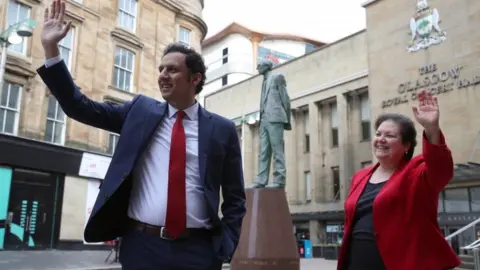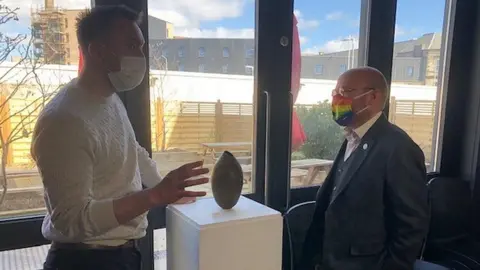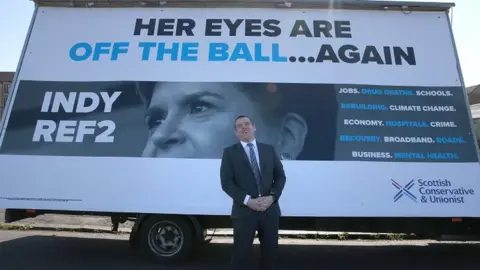Scottish election 2021: Labour plan to 'put women at heart of recovery'
 PA Media
PA MediaScottish Labour have pledged to put women "at the heart" of Scotland's recovery from the coronavirus pandemic.
Deputy leader Jackie Ballie said the party's "women's manifesto" would help create a fairer and stronger country.
Its proposals include moves to highlight gender pay gaps in public sector bodies and private companies awarded government contracts.
And a new enterprise unit would be created to assist the growing number of women launching start-up businesses.
A central fund would be established for historical equal pay claims, with extra support for retraining and childcare.
Women would also benefit from a £500 "Scottish Skills Benefit" which would help anyone who is unemployed or on furlough to retrain.

SCOTLAND ALERTS: Get extra updates on BBC election coverage

Ms Baillie also discussed the impact of the pandemic on women's health, reiterating proposals for "rapid diagnostic centres" - where patients get results within two weeks - to tackle thousands of cancelled or delayed cancer screenings.
"We can either allow the pandemic to take us backwards, or we can choose to invest in women as our economic powerhouse, unlocking billions in economic growth," Ms Baillie added.
"Scottish Labour is committed to putting women at the heart of our recovery."
Elsewhere on the campaign trail, Scottish Greens co-leader Patrick Harvie outlined proposed changes to planning policies in a bid to reinvigorate town centres.
On a visit to Dunfermline, Mr Harvie said artists should be allowed to occupy empty spaces on high streets hit by months of closures during the coronavirus pandemic and a decline caused by the rise of online retail.

The Greens' "local place plans" could see disused shops turned into artist-led spaces such as studios, cinemas, workshops or venues.
"We need to rethink our town centres so they become attractive places to be," Mr Harvie said. "Artists can play a huge role in a green recovery."

SCOTLAND'S ELECTION: THE BASICS
What's happening? On 6 May, people across Scotland will vote to elect 129 Members of the Scottish Parliament (MSPs). The party that wins the most seats will form the government. Find out more here.
What powers do they have? MSPs pass laws on aspects of life in Scotland such as health, education and transport - and have some powers over tax and welfare benefits.
Who can vote? Anyone who lives in Scotland, is registered to vote and aged 16 or over on 6 May is eligible. You can register to vote online.

In Dumbarton, SNP leader Nicola Sturgeon pledged to deliver 100,000 affordable homes in Scotland over the next decade.
Ms Sturgeon said her party had made affordable housing a "top priority" and it would "remain so for as long as the SNP is in government".
The SNP would also commit to investing £1.6bn over the next parliament to decarbonise the heating of homes and other buildings, and ensure that by 2026 all new houses delivered by registered social landlords and local authorities will be "zero emissions" homes.
"The SNP record on affordable housing stands head and shoulders above that of other parties," Ms Sturgeon said. "By giving both votes to the SNP on 6 May, people can elect a government which will prioritise greener, affordable housing to help support the economy, tackle poverty and meet our climate ambitions."
 PA Media
PA MediaThe Scottish Conservatives launched an ad van campaign in Ms Sturgeon's Glasgow Southside constituency claiming another independence referendum would "drag Scotland down".
After the first minister said in last week's STV leaders' debate that her government "took our eye off the ball" on drug deaths, Tory leader Douglas Ross spoke outside a drug rehabilitation centre that closed in 2019.
"We've seen what happens when she takes her eye off the ball," Mr Ross said.
"Drug deaths have doubled on Nicola Sturgeon's watch to the worst in Europe. When she's pushing for another referendum, her eye will be off the ball again and we won't be able to fix the broken system."
The Scottish Liberal Democrats, meanwhile, outlined plans to reform the Scottish Qualifications Authority (SQA), the agency involved in what they called the "loathed" exams algorithm last year.
With no exams due to the coronavirus pandemic, the SQA ran a system based on teacher assessments but then applied a moderation technique which led to about 125,000 estimates being downgraded.
Lib Dems leader Willie Rennie said he was "appealing to disillusioned SNP voters with a plan to put teachers at the heart of the SQA".
"The SQA still refuses to apologise," he added. "It maintains it did everything that John Swinney asked by creating the algorithm that penalised pupils based on their background. That sums up everything that is wrong at the top of Scottish education."

- BASICS: A really simple guide to the election
- POLICIES: Who should I vote for?
- CANDIDATES: Who can I vote for in my area?
- PODLITICAL: Updates from the campaign



Do you have a question about the Scottish Parliament election? Use the form below to send us your questions and we could be in touch.
In some cases your question will be published, displaying your name, and location as you provide it, unless you state otherwise. Your contact details will never be published. Please ensure you have read the terms and conditions.
If you are reading this page on the BBC News app, you will need to visit the mobile version of the BBC website to submit your question on this topic.

